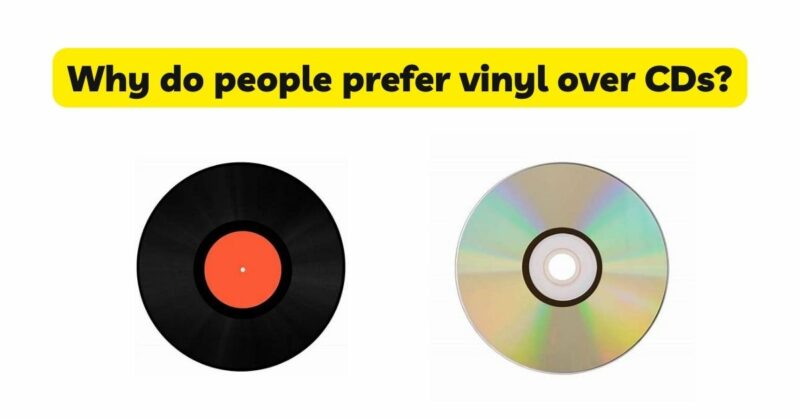In recent years, vinyl records have experienced a significant resurgence in popularity, drawing a passionate following of music enthusiasts. Many people, particularly audiophiles and collectors, express a strong preference for vinyl over CDs. This article explores the reasons behind the preference for vinyl and seeks to shed light on the factors that contribute to its enduring appeal.
- Tangible and Nostalgic Experience: One of the key reasons why people prefer vinyl over CDs is the tangible and nostalgic experience it offers. Vinyl records come in larger sizes, featuring artwork, liner notes, and lyric inserts that provide a visual and tactile connection to the music. Handling vinyl records and engaging with the physicality of the format adds a sense of nostalgia and connection to music’s history, creating a unique and immersive experience for the listener.
- Warm and Rich Sound Quality: Vinyl enthusiasts often argue that vinyl records offer a warmer and richer sound compared to digital formats like CDs. Vinyl’s analog nature and unique sound characteristics, including harmonic distortion and subtle surface noise, contribute to a more organic and immersive sound reproduction. Some listeners find this characteristic sound more pleasing and authentic, believing that it adds depth and emotion to the music.
- Preservation of Dynamic Range: Vinyl records are known for their ability to preserve dynamic range—the difference between the softest and loudest sounds in a recording. Unlike digital formats that may compress dynamic range to accommodate different listening environments, vinyl records often retain a wider and more natural dynamic range. This preservation of dynamic range can enhance the listening experience, providing greater detail and realism to the music.
- Collectibility and Rarity: Vinyl records have a long history and often carry a certain mystique. Collectors are drawn to the hunt for rare and unique releases, limited editions, and sought-after pressings. The vinyl market offers a vast array of classic albums and new releases, often with special editions and exclusive variants, making it an exciting prospect for collectors. The collectibility and rarity of vinyl records contribute to their desirability and preference among music enthusiasts.
- Emotional Connection and Sentimental Value: Vinyl records often hold sentimental value for individuals, evoking memories and personal connections to specific songs or albums. The act of collecting vinyl and curating a physical library can foster a sense of ownership and emotional attachment to the music. The tangible nature of vinyl and the nostalgia it evokes create a deeper emotional connection, making the listening experience more meaningful and personal.
- Audiophile Appeal: Vinyl’s preference among audiophiles is driven by the belief that it offers a superior listening experience. Audiophiles value the analog sound reproduction of vinyl, as well as the ritualistic process of setting up and playing a record. Vinyl playback systems, including high-quality turntables, cartridges, amplifiers, and speakers, allow audiophiles to fine-tune their setup and achieve the best possible sound reproduction. The pursuit of high-fidelity audio and the belief that vinyl offers a more accurate representation of the original recording contribute to its appeal among audiophiles.
- Resurgence of Physical Media: In the digital age where music is predominantly consumed through streaming platforms and downloads, the resurgence of vinyl represents a return to physical media. Vinyl’s popularity can be seen as a reaction against the intangible nature of digital music and the disposable nature of streaming. The desire for a tangible, curated music collection and the aesthetic appeal of vinyl records have driven their preference over the more transient nature of CDs and digital formats.
- Aesthetic and Artistic Appreciation: Vinyl records, with their larger album covers and artwork, provide a canvas for visual expression and artistic appreciation. The visual aspect of vinyl, combined with the tactile experience of flipping through records and examining the artwork,adds an additional layer of enjoyment and engagement to the overall music listening experience. The larger canvas allows for more intricate and detailed artwork, creating a unique artistic presentation that appeals to individuals who value the fusion of music and visual art.
Conclusion: The preference for vinyl over CDs can be attributed to a combination of factors, including the tangible and nostalgic experience, the perceived warm and rich sound quality, the preservation of dynamic range, the collectibility and rarity of vinyl records, the emotional connection and sentimental value they hold, the appeal to audiophiles, the resurgence of physical media, and the aesthetic and artistic appreciation of vinyl. While vinyl records offer a unique and immersive listening experience, it is important to recognize that preferences are subjective, and individual tastes may vary. Ultimately, the choice between vinyl and CDs depends on personal preferences, collecting goals, and the desired listening experience of each individual. Whether one chooses vinyl, CDs, or embraces a combination of formats, the love for music and the joy of collecting remain at the core of the vinyl resurgence.

